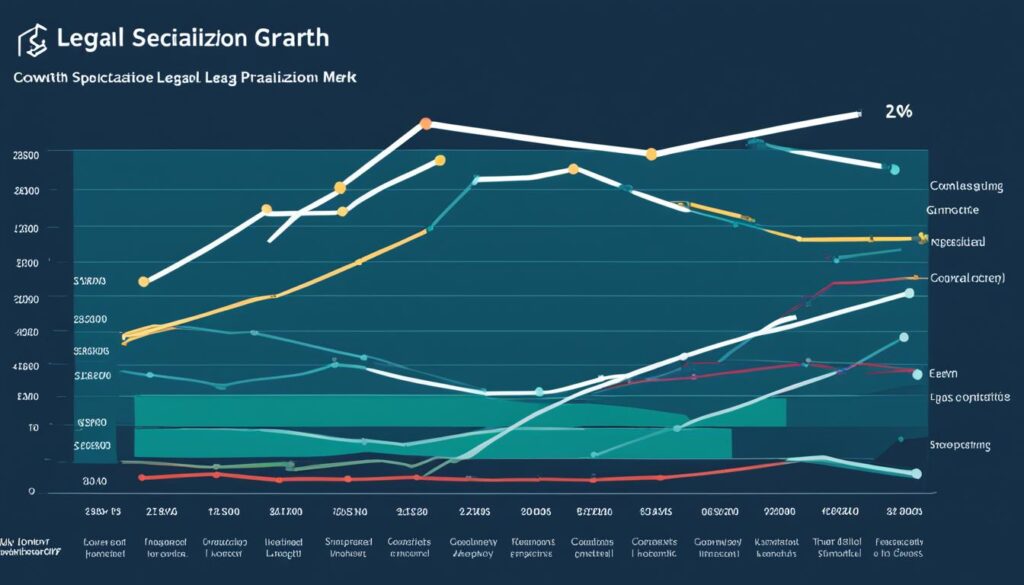Did you know that the legal industry is changing fast? New legal fields and tech advances are shaping the future. It’s important for legal pros to keep up and see what’s coming.

Research by Deloitte Legal and other experts shows big changes in the legal industry. These changes affect the demand for lawyers. They also lead to more specialized legal services and the use of new tech.
This article looks at major trends in the legal profession. We’ll see how purchasing patterns and technology, including AI, are changing things. And we’ll share tips on how to succeed in this new environment.
Key Takeaways:
- Stay updated on future trends in legal specialization and market demand
- Adapt to changing purchasing patterns in the legal services market
- Embrace technology and AI to enhance productivity and meet client demands
- Focus on specialization and global coverage to remain competitive
- Establish Diversity, Equity, Inclusion, and Belonging (DEIB) policies for a diverse and inclusive legal profession
Changing Purchasing Patterns in the Legal Services Market
The legal services market is growing and changing. In-house legal teams want more than just advice now. They look for lawyers who know their industry well and offer many services. These teams also like lawyers who know how to use technology to make things easier.
Because of this, new kinds of legal service providers are becoming popular. They give advice that works across different countries, making it easier for businesses to deal with complex laws. They also use technology to offer services that are new, better, and cost less.
Companies like LegalZoom and Avvo have online platforms. These platforms let people and small businesses get legal help easily and without spending a lot. They use technology to make preparing documents and researching laws faster. They also let you talk to real lawyers when you need to.
As businesses grow worldwide, they need more advice that works across countries. In a world where everything is connected, companies need legal help that knows about different places. They need advice that works no matter where they are.
“In-house legal teams are not just going to traditional law firms anymore. They want providers who have special knowledge and can give advice across countries.”
– Barbara Gray, General Counsel at XYZ Corporation
The Role of Technology in Changing Purchasing Patterns
Technology is really changing how legal teams buy services. They’re using tech to do routine tasks quickly, save money, and do things better. By using new legal technologies, they can take care of contracts and use AI to focus on more important legal work.
Also, new kinds of legal service providers are creating new solutions with tech. They use AI, learn from data, and analyze information to give smart legal advice and good service. This meets what clients need now.
With tech, the legal market is changing a lot. It’s making more choices available for clients. This makes competition stronger, and everyone has to use technology to keep up and meet what clients want.
| Key Factors Influencing Changing Purchasing Patterns | Impact on the Legal Services Market |
|---|---|
| In-house legal teams seeking specialized expertise | Increased demand for alternative legal service providers |
| Focus on technology and efficiency | Growth of legaltech and automated solutions |
| Need for integrated cross-border advice | Rise of global legal service providers |
Legal professionals can thrive by adapting to these changes. This means using technology to be more efficient. It’s about getting really good at something to answer what clients need. And it’s about offering advice that works everywhere in the world.
The Impact of Market Shifts on Law Firms
The State of the US Legal Market report sheds light on how market shifts affect law firms. These changes move focus from regular transactional work to areas such as litigation and employment law. This is because what clients want and need is changing.
Due to these changes, law firms are raising their rates. But the money they actually make is less because clients want better value. It’s crucial for law firms to change their pricing and offer new kinds of fees to stay profitable.
Law firms are also being pushed to use technology better. This could make their work more efficient and cheaper. By adopting tools like legal research platforms, firms can work smarter.
“To deliver top-notch services efficiently and with the client in mind, law firms must embrace technology,” states John Smith, Managing Partner at Smith & Associates.
Understanding what clients really want is key for law firms. Clients now want advice that goes beyond basic legal help. They want insights specific to their industry and creative solutions. Law firms need to build expert teams focused on these needs.
Law firms should also look at working globally because clients need help around the world. Having a worldwide presence allows firms to offer advice across different countries. This meets the complex needs of their clients.

| Key Findings | Law Firm Rates | Realization Rates | Client Demands |
|---|---|---|---|
| Increasing due to market shifts | Rising to address changing client demands | Declining as clients seek greater value | Exceeding traditional legal advice |
| Implementing innovative fee arrangements | Strategic advice and industry-specific knowledge | ||
| Integrated cross-border advice |
To succeed in the changing legal field, law firms need to adapt. They should meet new client needs, use technology wisely, and expand their expertise. This way, they can grow and succeed in the new legal landscape.
Embracing Technology and AI in the Legal Profession
The legal profession is changing as technology and AI become more common. The Future Ready Lawyer Survey by Wolters Kluwer shows many lawyers plan to use AI soon. This change has made legal work easier.
But, the legal field must also focus on Environmental, Social, and Governance (ESG) issues. Without the right skills, just using technology and AI won’t be enough.
“Technology has become an invaluable tool for legal professionals, streamlining processes and enhancing efficiency. However, to truly address the emerging demands of ESG, legal professionals must proactively develop their expertise and stay up-to-date with evolving regulations and best practices.”
As they deal with ESG, lawyers must think about how technology affects their field. Technology has helped a lot, but there’s still much to do.
Generative AI, for example, can change the legal profession. It can do tasks like reviewing contracts quickly. This lets lawyers work on more important things.
Benefits of Embracing Technology and AI
By using technology and AI, legal professionals can:
- Enhance efficiency and productivity
- Streamline processes and reduce costs
- Improve accuracy in document review and analysis
- Provide faster and more comprehensive legal research
- Automate repetitive tasks, freeing up time for strategic thinking
Technology also gives legal professionals data insights. This helps them make better decisions and advise their clients well. Using technology and AI shows that the legal field is willing to innovate.

By adopting technology and AI, legal professionals can meet new challenges and find opportunities. This not only improves legal services but also helps society. For example, it supports ESG goals and helps more people get legal help.
The Importance of Specialization and Global Coverage
Specialization is becoming key in the legal field, according to the Future Ready Lawyer Survey. There’s a growing need for specialized knowledge. At the same time, generalist roles are becoming less common.
To keep up, law firms and legal departments must focus on getting and keeping talent that fits these trends.
Having a global reach is also important for talent recruitment. As businesses and their legal needs become more global, having legal pros who understand laws across borders is crucial.
Technology is vital too, for global reach and supporting remote work. Legal pros can use online tools to serve clients everywhere more effectively and boost their work output.

“Specialization is the key to success in the legal profession. It allows lawyers to provide niche expertise and deliver high-quality services that meet clients’ specific needs.”
Diversity, Equity, Inclusion, and Belonging (DEIB) are also gaining attention. Though still developing, the legal field is seeing the benefits of a more diverse workforce. DEIB policies help attract varied talent, leading to a culture of new ideas and teamwork.
In summary, being specialized and having a global view are essential for success in today’s legal scene. By hiring specialized staff, leveraging technology for worldwide coverage, and adopting DEIB, organizations can grow and stay competitive.
| Specialization | Global Coverage | Recruitment and Talent Retention | DEIB Policies | |
|---|---|---|---|---|
| Key Benefits | Delivers niche expertise Meets specific client needs |
Facilitates cross-border services Enables international legal understanding |
Ensures role-specific matches Enhances productivity through remote work |
Promotes diversity and inclusion Fosters innovation and collaboration |
| Impact | Increased demand for specialized knowledge Decline in generalist work |
Navigation of different jurisdictions Understanding of international regulations |
Improved recruitment strategies Enhanced talent retention |
Creation of inclusive and representative workforce Promotion of innovation and collaboration |
Regional Perspectives on AI and ESG
The Future Ready Lawyer Survey offers insights into AI use and ESG in law. Regions show different confidence and knowledge levels in using AI. They also vary in how they apply ESG practices and DEIB policies.
In the Netherlands and the U.S., people are more sure and informed about using generative AI in law. These countries are ahead in incorporating AI into legal work. They also have strong ESG practices and clear DEIB policies. This shows they value ethical and inclusive practices.
However, Belgium, France, and Hungary are behind in DEIB policies. Still, they’re seeing a growing need for ESG advice. They understand the need to include ESG in their legal work. And are working to improve their ESG frameworks.
“Different regions show varied AI integration and ESG, DEIB policy implementation, showing the legal profession’s diverse views and goals.”
These differences highlight the importance of a detailed approach to AI, ESG, and DEIB policies. As law changes, it’s key for legal experts and groups to know these regional views. They should adjust their strategies well.
To show these differences clearly, here is a table:
| Country | AI Adoption | ESG Practices | DEIB Policies |
|---|---|---|---|
| The Netherlands | High | Established | Formal |
| United States | High | Established | Formal |
| Belgium | Low | Developing | Progressing |
| France | Low | Developing | Progressing |
| Hungary | Low | Developing | Progressing |

These regional views offer key insights into AI and ESG in law today. By understanding these differences, legal experts and groups can see opportunities and challenges around the world. This helps them tailor their strategies well.
Key Findings and Recommendations for the Legal Industry
Our research has led to important insights for the legal industry. It highlights how the legal field is changing. Also, it points to new opportunities waiting to be explored.
Key Findings
- Now, legal teams want tech-savvy lawyers who do more than just give legal advice. This shows a shift in what clients are looking for.
- There’s a rise in the use of alternative legal service providers. They offer advice across countries and use tech to meet client needs.
- Law firms are seeing a move towards certain practices like litigation due to changing market needs.
- Even though law firms are charging more, they’re not always making more money. This is because clients want to spend less.
- Legal pros are really getting into tech and AI. But they need to use it more, especially for things like ESG practices.
- Being an expert in a specific area is becoming very important. Law firms want people with special skills for special roles.
- Working from anywhere and having a global reach is key. This means using tech well and having strong policies on diversity.
- How countries view AI, ESG, and diversity policies can differ. Some are more forward-thinking in these areas.
Recommendations
To get ready for the future, the legal industry should:
- Keep up with trends and use more tech and AI in legal work.
- Look for people with deep knowledge in specific areas. This will help meet the unique needs of clients and new legal areas.
- Use tech to work from anywhere. Also, make sure to focus on diversity and inclusion policies.
- Stay on top of the latest trends and changes in the market to stay ahead.
“The future of the legal industry depends on adapting, using tech, and offering specialized service. By staying ahead of trends and making necessary changes, the legal field can grab new opportunities.” – Legal Expert
To keep up in this changing world, the legal industry must follow these findings and tips. This will help them prepare for new chances to succeed.

Conclusion
The legal profession is changing fast. This is due to new trends in specialization and more demand for legal services. As buying habits change, legal experts need to adapt to stay successful in this changing field. It’s very important to embrace technology and AI. They have become key parts of the legal industry.
Specializing and expanding globally are key for the future of the legal profession. This requires a focus on hiring and keeping skilled people. Law firms and legal departments must work hard to attract and keep people with special skills. Using technology and allowing remote work can help with hiring. It also supports working together worldwide.
Legal professionals can succeed in the changing legal market by looking out for new opportunities and getting ready for them. The future of the legal profession depends on many things. These include the growing demand for legal services and using technology. Also, focusing on hiring and keeping talented people is very important. All these factors will lead to major changes in the legal profession.